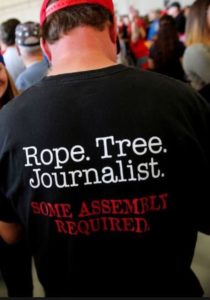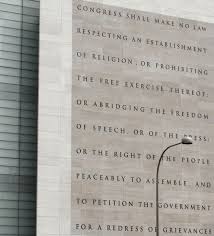It’s disheartening to hear a president use “fake news” to dismiss the very best of American journalism.
It’s the President’s favorite theme. If the phrase had a history prior to his administration, “fake news” has been reborn as the mantra of the Trump insurgency.

Anyone who has been paying attention knows that the President uses the term to mean news coverage he does not find to his liking. When he took that famous escalator ride to the lobby of Trump Tower to announce his candidacy several years ago he must not have understood that his words and checkered business would be under intense scrutiny.
Trump’s frustration with the news media is hardly unique. Most presidents and many mayors and governors have gone through rocky relationships with the Fourth Estate. At the same time, Americans understand that good journalism is sometimes going to make the powerful uncomfortable. Witness the sentimental heroics displayed in films like The Post (2017), All the President’s Men (1976), Frost/Nixon (2008) and Good Night and Good Luck (2005).
A reasonable description of this moment in our national politics is that, indeed, the American leader is getting terrible press. No doubt about it. He and his administration are at the center of a cable news cycle intensely focused on miscues and misdeeds. Evidence of malfeasance is also the subject of most of the negative coverage in the legacy print news media, including the New York Times and Washington Post, and in public policy publications like The Atlantic, The New Republic and, increasingly, The New Yorker. If that were not bad enough for the West Wing, reports from conservative outlets are only marginally more positive, with the important exception of Fox News. The Wall Street Journal and The Weekly Standard are far from positive. In addition, important conservative journalists like Max Boot, George Will and Bill Kristol are not fans. Even Tucker Carlson is wavering.
The term has become its own reality, obliterating distinctions between rigorous journalism and ill-considered rants.
Reality television and social media have proven to be bad models for the President. Anyone with a knowledge of American civil life will understand that “news” can take many forms and be shaped from a variety of perspectives. Phoney journalism has a long history in supermarket tabloids and reality shows not known for treating news gathering as a serious profession. And, of course, internet sites and social media largely ignore the rigors of traditional reporting. Most websites do little more aggregate stories from other sources, while issuing polemics to like-minded partisans. Indeed, there’s enough fake news around for everybody to lament.
Even so, it is disheartening to see a president dismiss the very best of American journalism from our legacy media. Among his followers, at least, this bogus indictment has the effect of undermining a cornerstone institution in American life. “Fake news” has become its own reality, obliterating distinctions between rigorous reporting and ill-considered rants. The phrase has also become a poison in the American body politic, slowly infecting every policy decision and utterance.
What is traditionally celebrated by a President now exists under a cloud of wild allegations.
It seems like Trump or his instructors at the University of Pennsylvania badly missed the mark many years ago. One wonders if a Wharton degree includes courses in American history and politics. How could he have missed the lessons of Jefferson, Franklin, Oliver Wendell Holmes and so many other defenders of the free press in an open society? Why is the language of human rights and press freedom hardly visible even at the margins of his limited lexicon?
Some of us occasionally have to pinch ourselves to realize that we are witnessing the use of the nation’s highest office to persecute a core institution of civil society. Among other things, Trump’s relentless attacks mimic old Soviet habits of fueling distrust for any sources not under the thumb of the state. Rather than celebrating a core value of the great American experiment, this administration seems intent on discrediting it.
![]()

